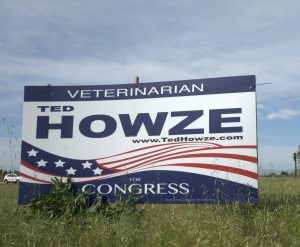
News that Ted Howze has already amassed $256,946 for his campaign in California’s Congressional District 10 (CA-10) rocked Democratic insiders like a rare San Joaquin Valley earthquake. Howze’s late entry was initially treated as frivolous, but now the prospect of a two Republican runoff has many Democrats increasingly fretful.
It’s a strong message that Democratic voters need to take their eyes off the primary and look hard at the general election. Not only is there an increasing possibility of a two Republican runoff in November, there’s also a chance for a weak Democratic finalist.
How could such a thing occur? In a five (Democrat) candidate race, it could happen when voters divide their ballots between two strong candidates and a third squeaks in ahead of them, with the two weakest candidates picking up the crumbs.
Let’s do the math: In 2014, the last off-year election in CA-10, 75,046 total votes were cast in the primary. Republican Jeff Denham received 44,237 of those votes (58.9%). The remaining 30,809 votes were split between Democrats Michael Eggman and Mike Barkley, with Eggman picking up 19,804 votes to place second and Barkley finishing with 11,005.
Just for the sake of round numbers and because of this election’s high voter interest, let’s say 100,000 votes are cast in CA-10 in the primary ending on June 5. Because there are now two Republicans, let’s say Jeff Denham’s percentage drops from almost sixty percent to forty-two percent (42,000 votes) with Ted Howze picking up another 15,000 votes (Republicans probably won’t garner as high a percentage this year as in 2014).
Now we’re left with 43,000 remaining votes and a 5-way split! Unless one Democrat pulls strongly away from the pack, Howze takes second place and Democrats get shut out of the general election altogether when five Democrats add up to two Republicans.
The other nightmare scenario for Democrats happens if two strong candidates divide votes. Say frontrunners Michael Eggman and Josh Harder split 21,000 votes between them, no matter the percentage, and Mike Barkley, Sue Zwhalen, or Virginia Madueno pulls in 16,000 votes. In that case, Democrats field a candidate in the general election who is likely not their voters’ first choice to beat Jeff Denham.
Unfortunately for Democrats, the two-Republican scenario is far more likely than the Democrat squeaker. At this point, though most observers agree that Michael Eggman and Josh Harder are vying for the lead, no Democrat has pulled away from the pack. Instead, several are obviously looking at the primary in exactly the way Ted Howze is—in terms of how few votes it will take to place second.
Sue Zwhalen, for example, pulled in 18,004 votes in her 2013 race for a spot on the Modesto City Schools Board of Education. Given her solid Modesto base, it’s very probable she looked at Michael Eggman’s 2014 vote totals and realized she had an excellent chance to pull in even more votes than Eggman did should she mount a strong CA-10 campaign.
Of course, Zwahlen, like Harder, Barkley, and Madueno, entered the race after Eggman’s announcement in 2017 that he wasn’t running. His reversal and late entry complicated things for everyone, but very likely encouraged Ted Howze to think he could cut a bigger piece of the ballot pie than any Democrat.
While Howze has virtually no chance of beating Jeff Denham in the general election, at this point he’s almost certainly focused on what he believes are good odds of grabbing a big enough slice of the vote to finish second in the primary. It’s the same kind of reasoning that pushed several other candidates into the race.
Most observers, Democrats and Republicans included, feel Howze has virtually no chance to place high in the June Primary Election. But Howze himself is very likely thinking that no one expected Donald Trump to be President of the United States either, but here he is. And Howze also knows that a second place finish might require far fewer votes than most people have reckoned on.
Trump’s victory was above all a sign that our two major political parties are in disarray, both nationally and locally. It’s highly unlikely what little Democratic Party leadership there is in CA-10 will help untangle the knots in the current five candidate primary. Instead, CA-10 voters themselves will have to come together soon and settle on the one or two candidates they believe most likely to beat Jeff Denham in November. Failure to do so could result in the horror of a toxic red tide instead of their much-anticipated blue wave.
